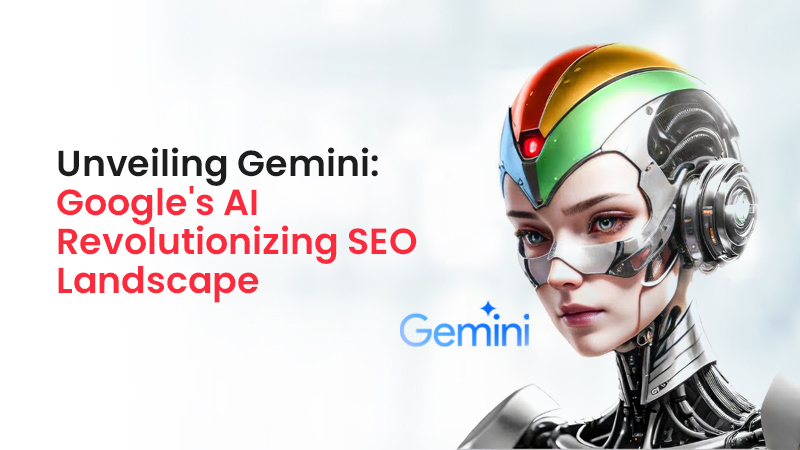In the constantly evolving landscape of digital marketing, maintaining a competitive edge is paramount. Google, the cornerstone of online discovery, consistently pioneers groundbreaking innovations to refine user experience and shape the future of search engine optimization (SEO). The latest addition to its arsenal, Google Gemini, emerges as a game-changer set to revolutionize the SEO landscape as we know it.
Understanding Gemini: The AI Marvel
Google Gemini represents a groundbreaking evolution in SEO methodology, leveraging the capabilities of Artificial Intelligence (AI) to redefine search algorithms and enhance understanding of user intent. Unlike traditional SEO practices reliant on keyword optimization and backlink strategies, Gemini operates on a sophisticated AI framework, capable of understanding complex queries and delivering hyper-personalized results.
Impact of Gemini on SEO Dynamics
1. Contextual Understanding: Gemini’s AI algorithms delve deeper into user queries, deciphering contextual nuances and intent behind search terms. For instance, a user searching for “best Italian restaurants” may be seeking recommendations for dining options nearby, dietary preferences, or culinary reviews. Consequently, content creators must prioritize relevance and user-centricity over keyword density, fostering meaningful interactions and enhancing user satisfaction.
Keyword research might still be relevant, but understanding user intent and tailoring content accordingly will be crucial. Gemini’s ability to anticipate user needs emphasizes the importance of creating content that addresses users’ pain points and provides genuinely valuable information.
2. Dynamic Ranking Factors: With Gemini, traditional ranking signals such as backlinks and meta tags take a backseat. Instead, factors like user engagement metrics, content quality, and semantic relevance emerge as pivotal ranking determinants. For example, a blog post garnering extensive social shares, comments, and dwell time signals its value to users, thus influencing its ranking position. Adapting to this shift necessitates a holistic approach encompassing content optimization, technical SEO refinement, and user experience enhancement.
3. Evolving Search Results: Google’s “Search Generative Experience” (SGE) powered by Gemini aims to answer user queries directly on the search engine results page (SERP) itself. This might mean fewer users clicking through to websites, potentially affecting traditional click-through rate (CTR) metrics. With SGE potentially providing summarized answers directly on SERPs, content quality will become paramount. Websites offering in-depth analysis, unique perspectives, and valuable insights will likely hold more weight in the eyes of search engines and users alike.
4. Personalized SERPs: Gemini’s AI prowess enables the delivery of highly personalized search engine results pages (SERPs), tailored to individual user preferences and browsing history. As a result, SEO strategies must pivot towards audience segmentation, persona targeting, and content personalization to resonate with diverse user cohorts effectively. For instance, a user interested in sustainable fashion may receive SERP listings featuring eco-friendly brands, upcycling tutorials, and ethical shopping guides, reflecting their unique interests and values.
How Gemini Powered SEO Landscape be Different from Traditional SEO
1. Intent-Centric Optimization: While traditional SEO focuses on keyword-centric optimization, Gemini emphasizes understanding and catering to user intent. This necessitates a shift from keyword stuffing to crafting informative, engaging content aligned with user needs and search context. For example, a blog post addressing common gardening challenges and offering practical solutions aligns with the intent of users seeking gardening advice, regardless of specific keyword variations.
2. Dynamic Adaptability: Unlike static SEO approaches, Gemini’s AI-driven algorithms continuously evolve to adapt to shifting user behaviors and search trends. Consequently, SEO practitioners must embrace agility, experimentation, and data-driven decision-making to thrive in this dynamic ecosystem. For instance, monitoring keyword trends, user engagement metrics, and SERP features empowers marketers to iterate and optimize their content strategies in real time, maximizing visibility and relevance.
3. Emphasis on User Experience: Gemini places paramount importance on user experience, prioritizing websites offering seamless navigation, fast loading times, and mobile responsiveness. Integrating UX design principles and optimizing for Core Web Vitals becomes imperative to maintain visibility and competitiveness in Gemini’s AI-driven SERPs. For example, implementing lazy loading techniques, compressing image files, and minimizing server response times enhance website performance, thereby improving user experience and SEO performance.
Traditional vs. Gemini-Era SEO: A Comparison
| Aspect | Traditional SEO | Gemini-Era SEO |
| Focus | Keyword optimization | User intent and problem-solving |
| Metrics | Click-through rate (CTR) | User engagement, time on site, content quality |
| Content strategy | Keyword-focused content | Content that addresses user needs and provides value |
Future Implications of Gemini on SEO
As Google Gemini gains prominence, its impact on SEO will continue to reverberate across the digital landscape. Anticipated developments include:
Voice Search Revolution: Gemini’s advanced natural language processing capabilities will catalyze the proliferation of voice search, necessitating SEO adaptation to conversational queries and long-tail keywords. For instance, optimizing content for voice search queries such as “Hey Google, find me the nearest vegan restaurants open now” requires a conversational tone and concise, informative responses.
Visual Search Integration: With AI-powered image recognition, Gemini opens avenues for visual search optimization, compelling brands to optimize multimedia content and leverage visual search-friendly metadata. For example, implementing descriptive alt text, structured data markup, and high-quality images enhances visibility in visual search results, driving organic traffic and engagement.
Hyper-Personalization: Gemini’s AI algorithms will enable hyper-personalized content recommendations and search experiences, challenging marketers to deliver tailored content experiences across multiple touchpoints. For instance, leveraging user data and behavioral insights allows brands to deliver personalized email campaigns, product recommendations, and dynamic website content, fostering deeper connections and driving conversions.
Conclusion
In conclusion, Google Gemini heralds a new era of AI-driven SEO, where relevance, context, and user-centricity reign supreme. Embracing this paradigm shift demands a departure from conventional SEO tactics towards holistic, adaptive strategies that prioritize user experience and semantic relevance. As we navigate this transformative journey, staying abreast of Gemini’s evolving capabilities and leveraging its potential will be paramount to unlocking sustained SEO success in the digital age.







